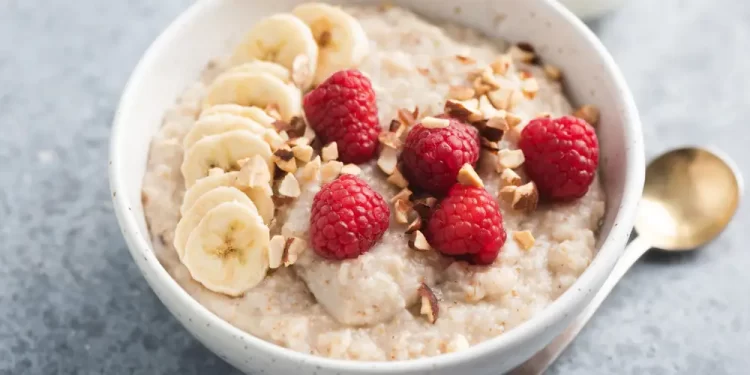Oatmeal is a great way to start the day. It's a hot cereal made of broken-down oat groats that you can mix with hot water or milk. Some would say it's one of the perfect breakfast cereals. Now, what would someone with diabetes say?
Diabetes is a medical condition that makes it difficult for a person to keep their blood sugar stable in a healthy range, which is crucial to maintaining a healthy life. This is because the body's ability to produce or manage insulin has been severely affected, thus leading to blood sugar spikes, which can result in complications.
Because of this, people with diabetes take special care to regulate their carb intake, as glucose is the end product of food rich in carbohydrates. This sugar can cause a sudden rise in blood sugar for someone with diabetes. This is why alternatives to foods rich in carbs and carbohydrate counting for foods in an existing diabetes diet are highly recommended.
Oatmeal, especially those made from whole grains, is perfect for people with diabetes because they have a low glycemic index, are rich in soluble fiber, and has other beneficial nutrients that aid diabetes management.
How Oatmeal helps manage Blood Glucose Levels
Oatmeal may be a high-carb food, but there are several benefits for people with diabetes who eat oatmeal.
Low Glycemic Index
Glycemic Index (GI) is one way people determine how food affects blood sugar. Foods with a high GI tend to cause blood sugar spikes, while foods with low GI help regulate them.
Oat foods, especially the ones made from steel-cut or rolled oats, have low GI scores of under 55. This is very low compared to other cereals like cornflakes, with a GI score above 70.
Rich in Fiber
Fiber-rich foods play an important role in digestion, especially for someone with diabetes. This is because dietary fiber helps slow down the breakdown and absorption of sugars into the body, preventing sudden rises in blood sugar and insulin levels.
Studies have shown that the average adult should consume about 25 to 30 grams of fiber each day but many adults do not come close. One of the health benefits of consuming oatmeal is important as it is rich in fiber. With a serving of Oatmeal containing about 8g of fiber, it is much easier to achieve your required dietary recommendations.
It helps in blood sugar control
Oat intake helps manage blood sugar levels because it contains a fiber called beta glucans. Various studies have shown this fiber to help reduce blood glucose levels in diabetic patients.
It keeps you feeling full
Keeping you feeling satisfied for longer periods is one of the health benefits of fiber-rich foods like Oatmeal. This helps you avoid constant snacking during the day and, in some cases, can help keep your total daily calorie count down. This is useful when trying to manage your weight or lose excess weight.
Oats for a Diabetes-Friendly Breakfast
Regarding a diabetes diet, some oats are better than others. Generally, all oatmeal comes from oat groats, which are processed into different forms of oatmeal, and the more processed the oats, the more beneficial the fiber it contains.
Having an oat enriched diet for your breakfast is important, but not all oats are equal in the nutrients they provide; here are the different types of oatmeal available,
Rolled Oats
Rolled Oats, also called slow-cooked oatmeal, are oat groats that have undergone steaming and flattening to create flakes.
Quick Oats
Quick oats, or instant oats, have undergone the process of steaming for a longer period, which is why they cook faster in water. They also get rolled into thinner pieces so they can cook more quickly, which leads to an increased GI score. Of all oatmeal, great care has to be taken when eating instant oatmeal due to its increased glycemic load.
Steel Cut Oats
Also called Irish oats, these oats are larger than rolled oats and take a lot longer to cook because it is the least processed oatmeal. They are also considered the best oats for people with diabetes as they hold the lowest GI score of all oats and help stabilize blood sugar.
Steel-cut oats are considered the best type of oatmeal to consume for a diabetes-friendly breakfast and to maintain a healthy diet. This is because they are the least processed type of oatmeal. Rolled oats are coming a close second as they have been partially cooked, increasing their GI score.
Instant oatmeal is considered the least healthy to consume because it has a GI score of 79, the highest of all oatmeal types, and is more likely to spike blood sugar than other oatmeal. The higher the GI score, the higher the food raises blood glucose.
Dos and Don'ts of Eating Oatmeal
Oatmeal is great for starting your day, it's a healthy alternative to other high-carb, high-sugar breakfast choices, and when managing blood sugar, precautions still has to be taken to how you consume oatmeal. Here are some do and don'ts to follow when eating oatmeal.
Dos
Make sure to eat it with protein or food with a healthy fat like nut butter and greek yogurt. Berries and cinnamon are also good toppings as they are full of antioxidants, have anti-inflammatory properties, and help improve insulin response. And when adding sweeteners, low-fat and unsweetened soy milk are the perfect choices.
Don'ts
Avoid pre packaged or instant oatmeal as these contain added sugar and salt and less soluble fiber. Be wary when adding dried fruit to your oatmeal, as just a tablespoon has high carbs, which can spike your blood glucose. If you are to reduce your calorie or fat content, reduce or avoid adding cream to your oatmeal; instead, use low-fat milk, soy milk, or even a brown sugar substitute.
























